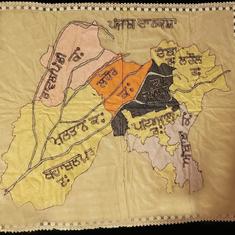As if being trounced in four states out of five wasn’t bad news enough for the Congress, the party also took a drubbing in the six bye-elections whose results were also announced on May 19.
The party won only one of these six constituencies – in Panki (Jharkhand) where it retained the seat it held.
The Congress lost the seats it held in Telengana and Gujarat.
In Uttar Pradesh, the crucial state that goes to polls next year, both Congress candidates lost their deposits. Of its two candidates, Shishu Pal Singh in Bilari was a political novice, while Shailesh Kumar Singh had finished 5th in Jangipur in the 2012 assembly elections.
The Bharatiya Janata Party won two seats out of the five it contested. It reclaimed the seat of Talala after a 10 year gap, by fielding the ex-MLA Govindbhai Varjangbhai Parmar, who had won the seat in 2002. In addition of its victory in Gujarat, the BJP also retained the seat of Godda, in Jharkhand, by fielding a young candidate, Amit Mandal.
The Telangana Rashtra Samithi won the Telengana bye-election in Palair, by fielding a heavy-weight candidate, the Roads and Buildings Minister and Member of the Legislative Council, Tummala Nageswara Rao. This was a hat-trick for the party, as it has won nearly every bye-elections held in Telengana in municipal and assembly elections since 2014.
In Uttar Pradesh, the Samajwadi Party drew big guns to support its two candidates in Bilari and Jangipur. The bye-election in Bilari in particular, situated in Moradabad district, was seen as a test in a difficult sub-region for the SP, ahead of the 2017 elections.
Bizarre case
Bye-elections are generally caused either by the death of a sitting MLA, or by sitting MLAs vacating their seats, say, after a victory in a general election. Only rarely do MLAs actually resign from their post.
Arunachal Pradesh recently was witness to a bizarre case, where two bye-elections should have been held this month after the resignation of two of its members – Wanglan Sawin, from the People’s Party of Arunachal (Khonsa East - ST) and Gabriel Denwang Wangsu, an Independent MLA from Kanubari (ST).
But these two bye-elections were stalled after the two MLAs contested the Speaker’s acceptance of their resignations. The Supreme Court eventually rejected their plea, but not in time that the bye-elections could be held.
Reasons for neglect
Parties usually don’t pay much attention to bye-elections, with the exception of those who seek to interpret them as a sign of a victory to come. The losing parties usually seek to explain away their losses in bye-elections as non-consequential local events.
However, in case of an approaching assembly elections, as in Uttar Pradesh for instance, major parties tend to invest significant resources and efforts in order to win the opened seats in order to generate a positive hawa – or wave – ahead of the real confrontation. Over the past few weeks, the Samajwadi Party's star campaigners and ministers had been camping in both Jangipur and Bilari in order to ensure the victory of their candidates.
But generally speaking, parties don’t care much for bye-elections, since they tend to be low-stake events for most (except after general elections, where the number of bye-election can significantly increase). Most bye-elections cannot affect the balance of power between parties in the state assembly. In Uttar Pradesh, the Bahujan Samaj Party does not even bother to contest by-polls.
Small parties in particular don’t have incentives to put much efforts into bye-polls and often satisfy themselves with supporting one of the major parties’ candidates.
In Godda, the Rashtriya Janata Dal candidate, Sanjay Yadav, for instance was officially supported by the Congress, the Janata Dal (United), the communists and the Jharkhand Vikas Morcha – which did not, however, prevent him from losing.
In Palair, the Congress nominee, Sucharita Reddy, contested with the support of the Telugu Desam Party and Yuvajana Shramika Rythu Congress Party, an odd combination indeed.
And, in Bilari, the Samajwadi Party candidate, Mohd. Faheem, contested with the support of Mukhtar Ansari’s Quami Ekta Dal, which is quite influential in this pocket of Eastern Uttar Pradesh.
Family connections
Most bye-elections tend to be largely determined by local considerations such as the personality of the candidate or local caste dynamics. They are often an opportunity for family transmission of seats. Rather than seeking fresh candidates, parties seek to bank on the sympathy wave caused by the demise of an MLA by giving the ticket to a kin, usually the son or the widow. This year was no exception, as four out of six winners (and one runner-up) are related to the deceased MLAs.
In Godda, Amit Mandal won his father’s seat on the same BJP ticket. In Panki, the Congress won by fielding the son of the departed MLA Bidesh Singh. In Palair, the Congress nominated the widow of Ramreddy Venkat Reddy (she lost by a huge margin). In Bilari, Mohd Faheem won his father’s constituency and in Jangipur, the Sanajwadi Party fielded deceased Minister Kailash Yadav’s widow, Kismatiya Devi.
It would be wrong to assume that these bye-elections have any predictive value, if anything because few parties actually put up a real fight. They are at the most an instant snapshot of the mood in specific localities.
For both winners and losers, however, they can either boost of drag down the troops’ morale. Something that the Congress can barely afford these days.
Gilles Verniers is Assistant Professor of Political Science at Ashoka University and co-Director of the Trivedi Centre for Political Data. Akashmegh Sharma is a second year undergraduate student in Ashoka University’s PPE program.











